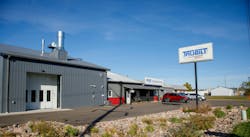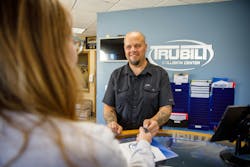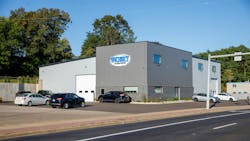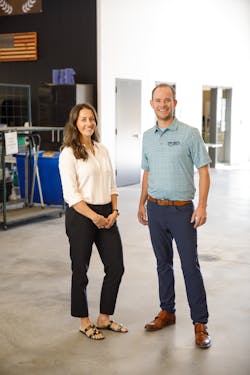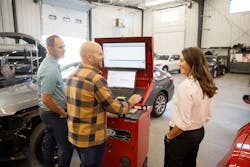Whether you’re planning retirement or thinking of buying the shop you’re managing, succession planning can help build a roadmap to get there.
Nearly 50 percent of respondents to FenderBender’s annual industry survey this year reported they have no plans to retire, which is down from 55 percent last year. But nearly 35 percent of all respondents reported they have no succession plan. About 18 percent plan to sell to a private buyer, about 6 percent plan to sell to a consolidator, and over 21 percent plan to leave the business to family or a business partner.
Siblings Luke Salter and Amy Wolfe, owners of Trubilt Collision Center in Eau Claire and Altoona, Wisconsin, didn’t set out to become collision repair shop owners. In fact, both were midway through college before they decided to remain working for their father, Jerry Salter, who’d built up the business at the original location in Eau Claire after buying it in 1997 with their mother, Lynn. It was in 2015 that the duo began to realize their desire to buy the business, a plan they fulfilled three years ago.
“Our father took a step back and kind of removed himself from the business,” CEO Luke Salter says, “and we essentially ran it for him. At that point, we realized it was on our radar that we wanted to own the business.”
Wolfe, president of the company, had originally gone to college for finance. At the same time she changed direction to study marketing and business, she started working at the shop part-time. What she planned to be a two-year commitment has turned into 15.
“My biggest driving factor after those two years was that we were really able to see some of our father's goals come to fruition. He trusted us with the vision he had for this place to continue to allow it to grow, so that was a fuel for my fire in terms of, ‘All right, maybe going back to school and completely changing industries isn't what I want to do. I'm enjoying this. I'm having fun with my dad. I'm having fun with my brother. Let's give it a go.’ And it has just kind of kept snowballing in a really great way.”
A Look in the Distance
Matt DiFrancesco, owner of High Lift Financial, is a certified exit planner who specializes in assisting collision repair shop businesses. He has not advised the Salters and Wolfe on their sale or any aspect of their business. But just as they planned for several years, he advises shop owners to plan far in advance, as much as five years before they plan to exit the business. The first step, to develop a plan, takes from 30 to 90 days, and implementing the plan can take from six months to two years, depending on how fast and responsive the client is.
“Too many shop owners come to me at 65 or 68 years old, and they're burned out and just want to get out,” he says. “Then we start looking at the numbers, and they're just not going to be able to achieve the lifestyle that they want because they haven't built enough value in the business to be able to exit it on their terms.”
The First Step
Salter and Wolfe were able to ease into ownership when the trio formed a holding company to buy what was known at the time as Happy Days Auto Body in nearby Altoona, Wisconsin, in 2018, with each holding one-third ownership in the acquisition. In 2021, the siblings bought Jerry Salter’s shares in both locations. The two locations are just a few miles apart, which might beg the question “Aren’t you going to cannibalize sales from your first location?” But Wolfe says the markets are “completely different,” and the town has been growing substantially. It's also where she lives and where her children go to school.
“We weren’t getting many repairs from that market,” Salter says. “We knew the Altoona community does most of its business in Altoona, so we wanted to be a part of that.”
To confirm their impression, they used GMAP Analytics, provided by Axalta, to analyze their repair orders and plot the customers’ addresses on a map to see from where their repairs have been coming.
“It can also pull data showing there’s 57,000 Subarus within a 30-mile radius, or 94,000 within 100. So, they can give us that data that helps with expansion and growth.”
Setting a Value
So, how does a family business set a price that’s fair to all parties? Wolfe says the oft-repeated method of using earnings before interest, taxes, depreciation, and amortization (EBITDA) is what’s typical of MSOs, such as those that had approached them in the past about selling. Instead, the family used the business’ accountant to do a valuation in 2021, with the state of sales and revenue from the time Wolfe and Salter took over most daily operations factored in the valuation.
“Because this is family, we didn’t want to get super in the weeds. But we all wanted to be protected and to ensure nobody was taking a financial hit. It was more just raw conversations with the three of us and our mom on what this looks like. Are they going to be taken care of? Can they maintain their quality of living and things like that? So, we were fortunate that we’re not spending a bunch of money to hire outside resources.”
Salter says it was a conversation Wolfe and he first had with their father in 2015.
“We knew we wanted to buy it at some point. But if we kept on growing the business, we would just increase the value that we would have to pay back to my father. He said, ‘I'll be fair with you guys. I understand that you are putting the work in to grow the place.’ So he gave us a value early on of what it would be when we got to that sellout point.”
From there, once they were ready to buy, Salter and Wolfe used the same bank their father and mother used in 1997. They still had to go through the same approvals and reviews of books, taxes, budgeting, and pro forma projections.
“But it was nothing abnormal or crazy that they wanted on their end,” Wolfe says.
Maintaining Healthy Family Relationships in Negotiations
From the time each of them was involved in the business, Salter and Wolfe say, their mother has served as the mediator and glue to make sure the family dynamics were not endangered.
“Our mom was kind of that impartial third party: ‘Hey, hold on. Our family comes first,’” Wolfe says. “If there's at any time the business is getting in the way or jeopardizing what we have as a family, she's thrown in the red challenge flag. And we've had several really difficult moments family internally in the business. ‘I don't like you as my brother right now,’ and ‘I don't like you as my dad right now.’ And ‘I don't like you as my sister.’ Looking back, those were really trying times. But at the same time coming out on the other side of it, it has made us a lot stronger and allowed us to buy a second location, to be able to work together and buy out our father and still go home. His wife is my best friend, and my husband is his best friend. We were able to have those things in the past that have really kind of laid a solid foundation for what our future looks like.”
Diminished Valuation
DiFrancesco says with family business successions, what is often used is what is called a diminished value, which allows the buyers, typically the children, to build equity more quickly.
“So at some point when the owner, the mom or dad want to fully exit, the buyer can now go out and get either SBA financing or a bank loan or something like that to get the remaining amount. But because they use the diminished value, they’ve built much more equity, which puts them in a better position to get the funds that they need.”
Likening his role to that of a coach, DiFrancesco says it’s a team effort, and he does not provide tax or legal advice; he enlists the aid of a CPA and attorney.
“I still handle the financial planning, such as any asset management and those type of things, but I'm coaching through the whole process to build the plan for them and walking them through the steps of the plan. When we need to, I bring in the outside professional, and I can speak the outside professionals language better than the owner.”
Another mistake owners commonly make, DiFrancesco says, is not considering the tax implications of an “internal sale.”
“It’s not about what you get for the business; it’s what you keep for the business. And even on third-party sales, you have to structure those deals properly to minimize tax liability as much as possible.”
Growing the Business
Since buying Altoona, Salter and Wolfe transitioned the shop to move away from a mix of restoration and collision repair work to focus on collision repair and to be process-oriented. The result is they’ve taken the 8,500-square-foot facility from about $800,000 in annual sales to $2.4 million. They just refurbished its paint department in October 2023. And in the time Wolfe joined the company, Eau Claire has grown from $1.3-$1.4 million to its current projected $6 million this year. An expansion completed in June has grown it to 20,000 square feet, which made room for the ADAS calibration center and additional body technician space. The Altoona location has 10 employees, and there are 22 at Eau Claire. The calibration center and towing company serve both locations as sublet vendors.
“We’re done spending money for a while,” Wolfe says with a smile. “We’ve gotta pay some bills now.”
Looking Down the Road
Although Salter and Wolfe have a long time before reaching the typical retirement age, they have given some thought to what their own succession plan would look like.
“I have two girls and Luke has two girls,” she says. “Right now, they really enjoy being in our TV commercials.”
The oldest is just 14, so she has a lot of time to consider her career path.
“There are more key employees who are stepping into management leadership roles who would probably want the helm of that ship before our children. At this time, that makes the most sense.”
Wolfe says she wouldn’t be opposed to her daughters taking over, but she remains realistic, and both Salter and she realize plans can always change.
As part of her participation in a Wisconsin 20 group, she’s had several conversations in the last 12 to 18 months with owners who have been bought out. Whether it’s a family member or a key person who takes over the business, she cautions there is more to consider than having worked in the business and having the necessary financing.
“If I didn't have Luke, there's no way I'd be able to do this by myself. I feel fortunate that there are two of us.”
Each shop’s situation is different, she notes, from the size of the shop to the number of employees who might be wearing different hats to make the business run smoothly.
“They think, ‘Yeah, I'd like to own my shop.’ Well, what does that look like? And have you really thought that out and what the all the layers that entails? There's so much more that goes into it that I think people just don't think about really the meat and potatoes of it.”
It’s working on the weekends at month-end and taking calls from customers, technicians, and other staff at every hour of the day, they say, that others don't often consider.
“Your mind doesn’t really shut off at all,” Salter says. “You’re always thinking about what’s next: ‘What can I be doing better?’ ‘What do we need to improve on?’”
If someone is working in the business as the owner approaches retirement, Wolfe advises him or her to start preparing now.
“You're not just going to be ready for it tomorrow. What does it look like from a savings aspect? How much cash do you have? What does your credit look like? Do you have a good accountant that you trust? Do you have a good attorney that you trust? Who is in your corner who will help you succeed when you have the opportunity to take a shop over?
“Not to get the carriage in front of the horse, but if it was one of my store managers who came and said, ‘Hey, I'm in this role. I know you guys are 10 or 12 years out from retiring. I just want to let you know that I'm saving. I've met with my accountant. I'd be like, ‘Hell, yeah. I'm really proud of you that you're thinking about this more than just, ‘Yeah, I'd like to run a body shop.’”
Planning for a Contingency
Regardless of what a business owner originally has in mind when he or she begins planning an exit, DiFrancesco says it’s crucial to consider all options and to plan for a contingency.
“It’s amazing to me how many shop owners tell me, ‘I want to transition, but I don’t have any kids who are interested in the business. I don’t have any key employees. I want to sell to a third party.’ But as I start putting them through the process, we start to realize that ‘Oh, you know what? My name remaining on the business is important. I like the legacy I’ve created for my community.’ Or ‘I want to take care of my employees.’ So a lot of times, what we’ll start doing is transitioning them to become more of what I call an incidental or absentee owner, where the business can function without them. And the interesting thing about that is not only does that free them up to be able to do other things that they want to do with their life, they maintain the (as I call it) cash cow, the business. But it also raises the value because the less dependent a shop is on the owner, the more value it has in it.”
About the Author
Jay Sicht
Editor-in-Chief, FenderBender and ABRN
Jay Sicht is editor-in-chief of FenderBender and ABRN. He has worked in the automotive aftermarket for more than 29 years, including in a number of sales and technical support roles in paint/parts distribution and service/repair. He has a bachelor's degree in journalism from the University of Central Missouri with a minor in aviation, and as a writer and editor, he has covered all segments of the automotive aftermarket for more than 20 of those years, including formerly serving as editor-in-chief of Motor Age and Aftermarket Business World. Connect with him on LinkedIn.
Don't miss Jay's next article or podcast. Sign up for FenderBender Today's Collision Repair News and ABRN eNews here.


